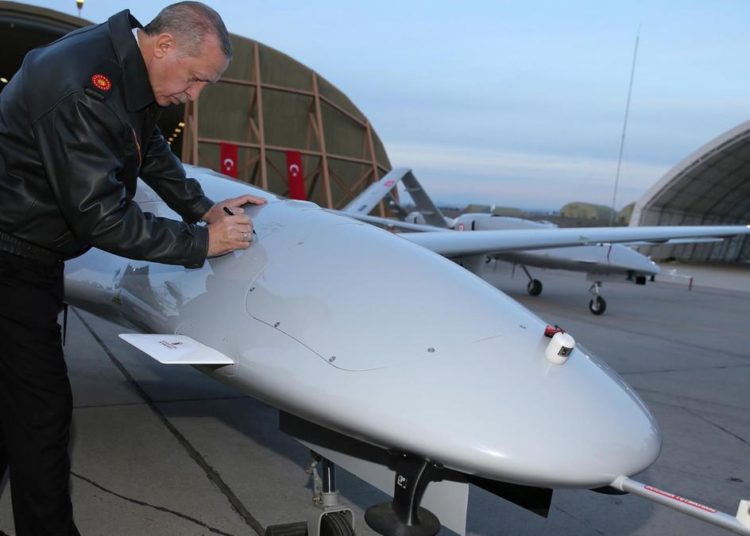Nordic Monitor
Azerbaijani Defense Minister Zakir Hasanov has announced that Baku is ready to purchase unmanned aerial vehicles (UAVs, or drones) from Turkey, the state-run Anadolu news agency reported.
Turkish-Azerbaijani defense cooperation is deepening at a time when Azerbaijan has been engaged in a massive effort to modernize and upgrade its military ties. In addition to defense industry exporters from other countries, Turkey also plays a significant role in providing arms and military technology to Azerbaijan, which spent around $2 billion on its defense industry in 2019.
Speaking to a local TV broadcaster about Azerbaijan’s new purchases for its armed forces, Hasanov also confirmed that the Turkish government would provide financial support for the purchase in accordance with a military financial cooperation protocol signed by Hasanov and his Turkish counterpart, Hulusi Akar, during President Recep Tayyip Erdoğan’s official visit to Baku on February 25, 2020.
According to the deal, which was approved by Azerbaijan’s parliament on May 31, Turkey will provide a total of 200 million Turkish lira, equivalent to around $30 million, to its Caspian ally for purchasing goods and services for military purposes from Turkish defense industry companies.

Neighboring partners Turkey and Azerbaijan have inked several military cooperation agreements to strengthen their already close military ties and boost Turkey’s defense exports to Azerbaijan.
Nordic Monitor had previously reported on the Turkey-Azerbaijan defense industry cooperation agreement that was signed in 2017 and is expected to be ratified by the Turkish parliament this year. The recent financial accord broadens the framework of the defense industry cooperation mechanism.
According to the text of the agreement, the mechanism focuses on improving defense industry capabilities through more effective cooperation in the fields of development, production and procurement, and the maintenance of military and defense materiel as well as technical and logistical support, information sharing and research in the field.
Azerbaijan is an important market for Turkish defense suppliers, and defense industry cooperation is seen by the Turkish government as a fundamental element of a larger trade framework. In 2019 Turkey and Azerbaijan had a trade volume of nearly $4.5 billion, and their goal is to increase it to $15 billion by 2023.

According to Caspian News, the arsenal of the Azerbaijani army includes weapons both domestically produced and purchased from foreign markets such as Israel, Russia, Turkey, the US, China, Belarus and others. While Azerbaijan diversifies its heavy-armament deals, Turkish defense industry giants are building new partnerships to take advantage of Azerbaijan’s increasing military expenditure.
In 2018 Aselsan signed an agreement with its Azerbaijani counterpart on the joint production of communications facilities. Similarly, Turkish Aerospace Industries (TAI) signed a cooperation protocol with the Azerbaijan National Academy of Sciences (AMEA) in September 2018 to combine efforts in the fields of defense and aviation. The same year, the Turkish Mechanical and Chemical Industry Corporation (MKE) received a defense cooperation offer from Azerbaijan’s Ministry of the Defense Industry, Anadolu reported. Moreover, Turkey’s Roketsan and Azerbaijani military-scientific enterprise Iglim have been working on developing a long-range missile system since 2009.

Since 2015 Turkey has been a key source market for purchases of armed drones such as Bayraktar drones and the TAI Anka, which have proven their capabilities in Syria and Libya. Bayraktar TB2 successfully test-fired a rocket for the first time in December 2015.
During Turkey’s military offensive in Syria’s Idlib province in February and March 2020, Turkish drones shooting MAM-L missiles proved adept at destroying Syrian government targets. Moreover, the Libyan National Army’s (LNA) goal of seizing the capital of Tripoli abruptly ended after Turkey’s intervention with its supply of multi-purpose Bayraktar TB2 drones, which were manufactured by Turkish company Baykar Makina. Baykar is led by Erdoğan son-in-law Selçuk Bayraktar.












